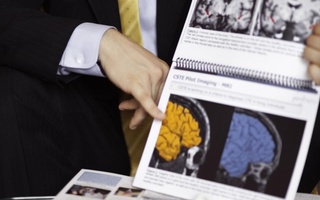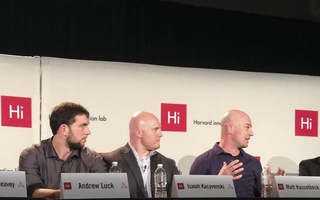As word of these discoveries began to spread, Nowinski began to collaborate with former New England Patriots linebacker Ted Johnson, who prematurely retired from the NFL in 2005 because of concussion symptoms that would later cause him to suffer from depression and headaches and show early signs of Alzheimer’s. Johnson placed part of the blame on Patriots coach Bill Belichick for pressuring him to participate in full contact drills three days after suffering a concussion.
Nowinski also investigated the case of former wrestler Chris Benoit, who killed his wife, seven-year-old son, and himself after suffering from depression in 2007. Nowinski contacted Benoit’s father, suggesting that years of brain trauma may have led to his son’s actions. Nowinski sent the brain to Bailes, who found it to have an advanced form of dementia caused by CTE that had brought about the behavioral problems.
FINDING A SOLUTION
These types of cases led Nowinski to realize that the problem was bigger than even he had imagined. He came to believe that a organization dedicated to the cause was needed, one that could focus solely on the concussions problem.
He approached his former doctor about forming an institute that would advance the study of the effects of brain trauma in athletes.
Cantu agreed, and the Sports Legacy Institute was founded in June 2007 to work toward a solution to the concussion crisis in sports “through medical research, treatment, and education & prevention.”
“[I knew] the research was the key to changing this,” Nowinski says. “So SLI was conceived to facilitate the research and turn it into policy and education to protect kids.”
Upon starting SLI, Nowinski and Cantu also wanted to find a home for that research at a top-tier medical school.
After seeing a presentation by Dr. Robert Stern—director of the Alzheimer’s Program at Boston University—that linked brain trauma to Alzheimer’s, Nowinski reached out to Stern about starting the Center for the Study of Traumatic Encephalopathy (CSTE), which opened at BU in 2008. As co-director, Nowinski is primarily responsible for obtaining brain donations from the families of former football players whose lives were affected by post-concussion syndrome.
And when Nowinski decided he wanted to begin collecting brains, he knew he could turn to his other half first.
Part two of the Polish Connection—having witnessed firsthand the impact concussions had had on Nowinski—readily agreed.
“It was a no-brainer,” Kacyvenski says. “Pun intended, by the way.”
According to the organization’s website, the mission of the CSTE is “to conduct state-of-the-art research on chronic traumatic encephalopathy through the study of its neuropathology, pathogenesis, clinical presentation, disease course, genetic and environmental risk factors, and ways to prevent this progressive dementia.”
“Working with the families of brain donors is very rewarding,” Nowinski says. “[So is] getting buy-ins from youth coaches, and hearing the success stories of coaches who virtually eliminate hitting from practice, as we recommend.”
As co-founder and president of the Sports Legacy Institute, Nowinski is also responsible for development, fundraising, and designing educational programs. He often travels to give presentations to schools and organizations about “conquering concussions.”
Read more in Sports
TEAM OF THE YEAR RUNNER-UP: Crimson Dominates Nation’s BestRecommended Articles
-
Ivy League Leads Trend in Concussion PreventionThe winds of change howling through the world of sports safety have become impossible to ignore. Traditional football has nearly been toppled by the gusts, and the winds’ next victim, hockey, lies just around the corner. Adding to the drafts is none other than our little Ivy League. The breezes began back in 2009, when the NFL was called out by Congress for not adequately protecting its players from the dangers of concussions and other head injuries.
-
Who You Should Root for in the NFL PlayoffsHome team knocked out of the playoffs? Still reeling from Fitzpatrick’s fourth place AFC East finish? The Back Page has ...
-
 Concussed: Down and Out
Concussed: Down and Out -
Panelists Discuss Head Trauma ResearchThree panelists described current medical research and long-term goals to reform care and policy on athletic head trauma and concussions during a biannual symposium of the Harvard Society for Mind, Brain, and Behavior in Science Center C on Friday afternoon.
-
Murphy Era of Harvard Football Turns 20Twenty years into his Harvard tenure, football coach Tim Murphy reflects on the most memorable games, seasons, and players of his career with the Crimson.
-
 Professional Athletes Discuss Intersection of Sports, Tech at I-Lab
Professional Athletes Discuss Intersection of Sports, Tech at I-Lab













